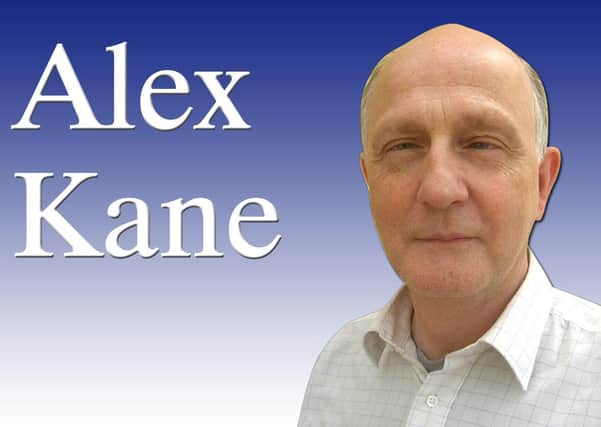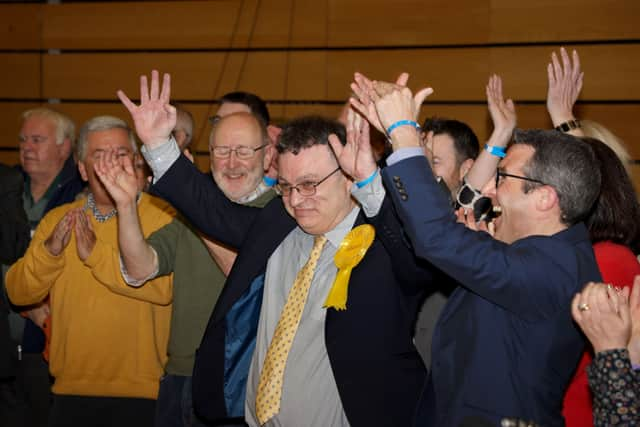Alex Kane: Unionism needs to do more than just ‘hang in’


That, for me, was the key line from a typically eloquent, thoughtful piece by my former party colleague Jeff Dudgeon, in response to last week’s column posing the question, what does unionism do?
(Jeff Dudgeon’s article can be read here : ‘The endgame for unionists to which Alex Kane refers still has a long way to run’)
Advertisement
Hide AdAdvertisement
Hide AdMy throwback to Jeff is that it reminded me of Mark Twain’s comment about the sort of pessimist (in this instance, me) who believes that, in some cases, the optimist is probably right.


Unionism has lost its majority in the Assembly; lost its majority on Belfast City Council (Jeff was one of the electoral casualties last time); at present it doesn’t return a majority of the MPs from Northern Ireland; key players worry that successive UK governments seem determined to bend over backwards to keep Sinn Fein anchored within the peace/political process; it looks like the Withdrawal Agreement will see a border in the Irish Sea (meaning NI will be treated specifically and crucially different from the rest of the UK); and, on key issues of importance to unionism (and Jeff, like the News Letter, has been a hugely important voice on legacy), unionists cannot rely upon a UK government to be in their corner.
So, arguing that the unionist strategy can only be one of hanging in, strikes me, on first sight, as a weak argument.
That said, it’s certainly a much better argument than that of Terri Jackson who, in a letter to the paper (‘The Union is safe for decades to come,’ July 17), claimed the ‘Union is safe for decades to come (because) in the 2019 last general election the number voting for unionist candidates was at least 150,000 more than those who voted for nationalist candidates.’ Hmm.
Advertisement
Hide AdAdvertisement
Hide AdIn that election 343,306 votes were cast for unionist parties and candidates (43%), against 300,590 votes for Sinn Fein and the SDLP (37.7%). That’s a gap of 42,716 and 5.3%. My hunch would be that People Before Profit and Aontú voters (who accounted for 2%) would run heavily in favour of nationalism. Alliance and Greens gathered 136,111 votes (17%) and I think the general view would be that both parties are probably neutral on the Union, so shouldn’t, automatically, be included in the unionist column.
Even if those two parties were to split 50/50 in a border poll that would take the pro-Union vote to just 51.5%. Personally, I think it would be higher, but it would be reckless, utterly reckless, for unionism to assume ‘it’ll be alright on the night’. Every vote needs to be worked for.
Now, back to Jeff’s point and another question: is it possible for unionism to make progress even if it is merely ‘hanging in’? Yes, of course it is. When asked how he had come upon the theory of gravity, Newton replied, “By thinking upon it continuously.” And that’s exactly what unionism needs to do when it comes to sustaining a majority for the Union.
It wasn’t very long ago when the evidence of background, upbringing, religion, school attended, what their parents did, where they lived etc would provide a reasonably accurate yardstick for identifying someone with pro-Union roots and, consequently, likely to be or become a unionist voter. Yet, as can be seen in the recent shift from unionist to ‘other’ (particularly Alliance) it can no longer be taken for granted that someone with pro-Union roots will vote for a party which clearly identifies as unionist. Why not?
Advertisement
Hide AdAdvertisement
Hide AdThat question can only be answered when there is very detailed analysis of what someone from a pro-Union background actually wants. Or, maybe more important, what they don’t want.
The Ulster Unionist Party, for instance, has been particularly badly hit by Alliance. Why? Why would someone who used to be reasonably comfortable with the UUP (and probably still describe themselves as pro-Union) change, and vote for a party which describes itself as mostly neutral on the constitutional question? What is that voter getting from Alliance that isn’t available from the UUP (or DUP, TUV, PUP or Conservative)?
Party political unionism needs the answer to those questions or it may discover that the continuing drift to ‘others’ will rob the DUP of its lead role in the Assembly at the next election. In other words, if unionists (or enough of them) reckon that Alliance is a safe enough choice in Assembly, Westminster and council elections then party political unionism is in for bigger blows.
Fair enough, voting Alliance doesn’t mean you wouldn’t vote for the Union in a border poll; but voting Alliance does mean that the likely electoral casualty is from a unionist party and that, as we have seen, can means fewer unionist MPs, MLAs and local councillors. Look at North Down last December.
Advertisement
Hide AdAdvertisement
Hide AdIf there is no such thing as a freestanding definition of unionist and unionism, how can unionist leaders and strategists make convincing claims about unionism and unionist politics?
In the last few days I have heard Lord Empey, Steve Aiken, Jim Allister and Sammy Wilson fire broadsides over the government’s bows about how Northern Ireland is being treated within the Withdrawal Agreement package and the specific NI Protocol. What the broadsides suggest is the leadership of political unionism is concerned; which, in turn, fuels broader concerns within unionism (both big-U and small-u).
Unionism is a very diverse community, with a huge mix of parties, fringe groups, manifestations, nuances, differences, priorities and interests. That makes it difficult to agree on central messages. It makes it even more difficult to agree on a definition of modern unionism which appeals to a softer, Alliance-leaning pro-Union base, while preserving the core myths and boundary symbols of more traditional unionism.
Crucially, for an ideology which usually interprets compromise as capitulation, any attempt to soften the message tends to end badly.
Advertisement
Hide AdAdvertisement
Hide AdJeff is probably right, though: ‘hanging in’ is maybe the only available strategy for unionism. But ‘hanging in’ should also be accompanied by a willingness to ask difficult questions of itself.
By the way, I remain un-persuaded that the endgame I mentioned last week will be as long as Jeff and others hope/believe it will be.
——— ———
A message from the Editor:
Thank you for reading this story on our website. While I have your attention, I also have an important request to make of you.
With the coronavirus lockdown having a major impact on many of our advertisers — and consequently the revenue we receive — we are more reliant than ever on you taking out a digital subscription.
Advertisement
Hide AdAdvertisement
Hide AdSubscribe to newsletter.co.uk and enjoy unlimited access to the best Northern Ireland and UK news and information online and on our app. With a digital subscription, you can read more than 5 articles, see fewer ads, enjoy faster load times, and get access to exclusive newsletters and content. Visit https://www.newsletter.co.uk/subscriptions now to sign up.
Our journalism costs money and we rely on advertising, print and digital revenues to help to support them. By supporting us, we are able to support you in providing trusted, fact-checked content for this website.
Alistair Bushe
Editor